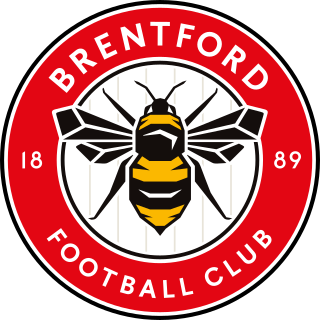Related Research Articles

Brentford Football Club is a professional football club in Brentford, West London, England which competes in the Premier League, the highest tier of English football. Nicknamed "The Bees”, the club was founded in 1889 and played home matches at Griffin Park from 1904 before moving to Gtech Community Stadium in 2020. Their main rivals are fellow West London-based clubs Fulham and Queens Park Rangers. They are affiliated with the women's club Brentford Women FC.
John Gilbert Cock MM MID was an English footballer who played for various English club sides as a centre forward. He also had the distinction of being the first Cornishman to play for the England national team, a decorated World War I soldier, and an actor. His younger brothers, Donald Cock and Herbert Cock, also played professional football.
Herbert Cock was an English professional footballer who played as a forward and made one appearance in the Football League for Brentford.
During the 1920–21 English football season, Brentford competed in the Football League Third Division. It was Brentford's inaugural season in the Football League and ended with the club successfully applying for re-election.
During the 1921–22 English football season, Brentford competed in the Football League Third Division South. The club improved on its debut season in the league to finish 9th, which would be its highest placing until 1929–30.
During the 1922–23 English football season, Brentford competed in the Football League Third Division South and finished in 14th place.
During the 1923–24 English football season, Brentford competed in the Football League Third Division South and finished in 17th place.
During the 1924–25 English football season, Brentford competed in the Football League Third Division South. After finishing in 21st place, the club successfully applied for re-election. The 41 goals scored during the season is the fewest in club history.
During the 1925–26 English football season, Brentford competed in the Football League Third Division South and finished in 18th place, conceding a club record 94 goals.
During the 1926–27 English football season, Brentford competed in the Football League Third Division South. In Harry Curtis' first season as manager, the club finished 11th and advanced to the fifth round of the FA Cup for the first time.
During the 1928–29 English football season, Brentford competed in the Football League Third Division South. An unbeaten start to the season was cancelled out by a run of 11 defeats in 12 games which left the Bees bottom of the Football League, but the team recovered to finish in mid-table.
During the 1933–34 English football season, Brentford competed in the Football League Second Division for the first time in the club's history. A strong run in the middle of the season saw the Bees hold the second promotion place throughout March 1934, before a slight drop in form led the club to a still-impressive 4th-place finish.
During the 1937–38 English football season, Brentford competed in the Football League First Division. In the league, the Bees matched the previous season's finish of 6th and advanced to the 6th round of the FA Cup for the first time in club history. In 2013, the Brentford supporters voted 1937–38 as the club's second-best season.
During the 1950–51 English football season, Brentford competed in the Football League Second Division. Amidst a period of transition, the Bees repeated the previous season's 9th-place finish.
During the 1949–50 English football season, Brentford competed in the Football League Second Division. In his first season as manager, Jackie Gibbons guided the club to a 9th-place finish, a marked improvement on near-relegations in the previous two seasons.
During the 1918–19 English football season, Brentford competed in the London Combination, due to the cessation of competitive football for the duration of the First World War. Buoyed by larger crowds after the Armistice, Brentford finished the season as champions of the London Combination.
During the 1919–20 English football season, Brentford competed in the Southern League First Division. In the first season of competitive football since the end of the First World War in November 1918, Brentford consolidated with a mid-table finish. It was the club's final Southern League season, as 21 of the 22 First Division clubs were voted into the new Football League Third Division in May 1920.
During the 1913–14 English football season, Brentford competed in the Southern League Second Division. Despite winning 13 of 15 matches in the first half of the season, a loss of form in a five-week spell from February through to April 1914 ended the club's chances of an immediate return to First Division.
During the 1917–18 English football season, Brentford competed in the London Combination, due to the cessation of competitive football for the duration of the First World War. In a patchy season, the Bees finished in mid-table.
During the 1969–70 English football season, Brentford competed in the Football League Fourth Division. Despite staying in the promotion places throughout much of the campaign, three-late season defeats cost the Bees promotion to the Third Division.
References
- 1 2 Haynes, Graham; Coumbe, Frank (2006). Timeless Bees: Brentford F.C. Who's Who 1920–2006. Harefield: Yore Publications. p. 39. ISBN 978-0955294914.
- 1 2 "Player Details". Port Online. Retrieved 15 January 2017.
- ↑ White, Eric, ed. (1989). 100 Years Of Brentford. Brentford FC. p. 390. ISBN 0951526200.
